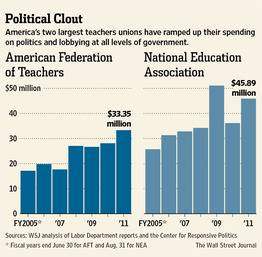Wisconsin -- unions vs. kids
From the NY Post by Michelle Malkin:
Students were the first and last casualties of the ruthless Big Labor war against fiscal discipline.
To kick off the yearlong protest festivities, the Wisconsin Education Association Council led a massive “sickout” of school personnel. The coordinated truancy action — tantamount to an illegal strike — cost taxpayers an estimated $6 million.
When they weren’t ditching their students, teachers were shamelessly using other people’s children as their own political junior lobbyists and pawns. A Milwaukee Fox News affiliate caught one fourth-grade teacher dragging his students on a “field trip” to protest against Walker at the state Capitol building.
The pupils clapped along with a group of “solidarity singers” as they warbled: “Scott Walker will never push us out, this house was made for you and me.”
According the WisconsinReporter.com, cash strapped state affiliates also coughed up major sums to beat back Wisconsin’s efforts to bring American union workers into the 21st century and in line with the rest of the workforce:
“The Ohio Education Association made a $58,000 in-kind contribution May 30, followed a day later by a $21,000 contribution from the Pennsylvania State Education Association. New York State United Teachers gave $23,000 on June 1, the Massachusetts Education Association gave $17,000 on May 31, and a group of unions based in Washington, DC, poured in $922,000 during the past week.”




